On October 13th, readers from all over New England descended upon Brattleboro, Vermont, for the 22nd annual Brattleboro Literary Festival. Nestled between the West and Connecticut rivers, Brattleboro was the perfect setting, boasting not just the festival itself but many delicious restaurants, plentiful shopping and tons of recreational activities.
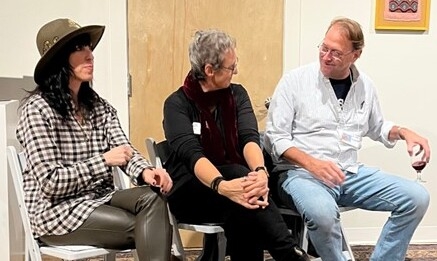 The festival began (somewhat ominously, though you’ll see why it was perfect) on Friday the 13th, when Jennifer McMahon (MY DARLING GIRL), Margot Douaihy (SCORCHED GRACE, the first novel from Gillian Flynn’s imprint), and Michael Ruhlman (perhaps best known for his cookbooks, but also the editor of CLEVELAND NOIR, a collection of mystery shorts set in the CLE) spoke about the catharsis of fear. Though they each approach the horror, mystery and thriller genres from different angles and backgrounds, all three authors agreed that there is something that we as a society love about being afraid…especially in a book.
The festival began (somewhat ominously, though you’ll see why it was perfect) on Friday the 13th, when Jennifer McMahon (MY DARLING GIRL), Margot Douaihy (SCORCHED GRACE, the first novel from Gillian Flynn’s imprint), and Michael Ruhlman (perhaps best known for his cookbooks, but also the editor of CLEVELAND NOIR, a collection of mystery shorts set in the CLE) spoke about the catharsis of fear. Though they each approach the horror, mystery and thriller genres from different angles and backgrounds, all three authors agreed that there is something that we as a society love about being afraid…especially in a book.
McMahon explained that she grew up the daughter of an alcoholic mother and never knew what she would find when she came home. She now emulates that fear of the unknown in her work. Ruhlman added that readers “love to be scared in the same way we love tragedy”: we don’t love to be scared or tragic, but we love the cathartic release that comes when the story ends and the world goes back to normal. Douaihy won the “word of the day” competition with her use of the word “electrifying,” which she uses to describe the transformation a reader undergoes when reaching the bottom of the rollercoaster of survival. She noted that the transformation from fear to catharsis is something both cultural and individual, and that mysteries unify these elements because everyone can relate to the “catastrophe of the unknown.”
All writers agreed that fear in a book is only possible when an author has crafted characters a reader can care about, and when there is a sublime mixture of beauty and terror. But perhaps the best line of the night came when McMahon quipped, “If you want a happy ending, don’t read my books.” As a huge fan of her works (she generously signed four of her books for me after the panel!), I can confirm that happy endings are few and far between. But like her fellow panelists, McMahon always satisfies, intrigues and delights.
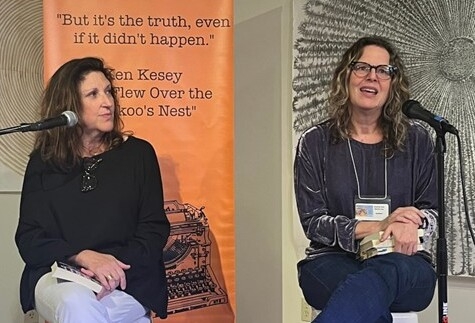 The following day began bright and early, with the first panel at 9:30. Fortunately, the organizers of the festival know the only thing that could get this reader up that early: humor. Laura Zigman (SMALL WORLD) and Catherine Newman (WE ALL WANT IMPOSSIBLE THINGS) discussed the juxtaposition of seriously depressing subjects with laugh-out-loud perspectives and a witty sense of humor. In their most recent books, they address difficult topics --- the reunion of estranged sisters; the death of a woman’s best friend to cancer --- yet they do so with a humorous “well, what can you do?” tone. Though Zigman and Newman only met that weekend, they appeared to be lifelong best friends, often stopping to interrupt and laugh with or prompt one another, turning the panel into almost a living work of art, a reflection of the perfect tones of each of their books.
The following day began bright and early, with the first panel at 9:30. Fortunately, the organizers of the festival know the only thing that could get this reader up that early: humor. Laura Zigman (SMALL WORLD) and Catherine Newman (WE ALL WANT IMPOSSIBLE THINGS) discussed the juxtaposition of seriously depressing subjects with laugh-out-loud perspectives and a witty sense of humor. In their most recent books, they address difficult topics --- the reunion of estranged sisters; the death of a woman’s best friend to cancer --- yet they do so with a humorous “well, what can you do?” tone. Though Zigman and Newman only met that weekend, they appeared to be lifelong best friends, often stopping to interrupt and laugh with or prompt one another, turning the panel into almost a living work of art, a reflection of the perfect tones of each of their books.
Because so many of us have experienced similar family dysfunction or tragedy, the authors focused much more on craft in their talk, explaining that they write first, then go back and edit for humor. Newman said that she often writes down her “zany” daughter’s quotes and uses them later. Zigman also noted a real-life connection to her work, sharing a touching story about how her latest book brought her and her sister back together after a long estrangement following their parents’ deaths to cancer. Once again, the theme of “catharsis” was championed, with the authors agreeing that though they’ve written perhaps the most depressing subject matters of all, there’s something freeing about facing tragedy head-on and laughing anyway.
 Later that morning, I attended a riveting discussion with perhaps the best-paired panelists of all time: Jill Bialosky, whose novel THE DECEPTIONS centers on a woman who finds solace in the Metropolitan Museum of Art; and Patrick Bringley, whose memoir ALL THE BEAUTY IN THE WORLD chronicles his time as a guard at the very same museum. It’s rare to see pairings of fiction and nonfiction, yet they gelled so well that it seemed as if they were destined to speak together. Both spoke in awe of artists but maintained that the purest value of art comes not from the artist, but from the viewer, who arrives at each piece with their own insights and perspectives and then takes in the art to make their own meaning.
Later that morning, I attended a riveting discussion with perhaps the best-paired panelists of all time: Jill Bialosky, whose novel THE DECEPTIONS centers on a woman who finds solace in the Metropolitan Museum of Art; and Patrick Bringley, whose memoir ALL THE BEAUTY IN THE WORLD chronicles his time as a guard at the very same museum. It’s rare to see pairings of fiction and nonfiction, yet they gelled so well that it seemed as if they were destined to speak together. Both spoke in awe of artists but maintained that the purest value of art comes not from the artist, but from the viewer, who arrives at each piece with their own insights and perspectives and then takes in the art to make their own meaning.
Their serious debate on art and meaning was equaled by Bringley’s laugh-out-loud stories of visitors to the Met (including one man who attempted to sit on the lap of a statue because he didn’t know he couldn’t) and Bialosky’s stories of her early days in New York and the home she found in the Met when she was a young editorial assistant. Perhaps the best-attended and most engaging talk of the day, this panel was an urgent reminder to other festival organizers to think outside the box and pair authors whose themes are similar, even if their chosen vehicles for writing them are not. Brava!
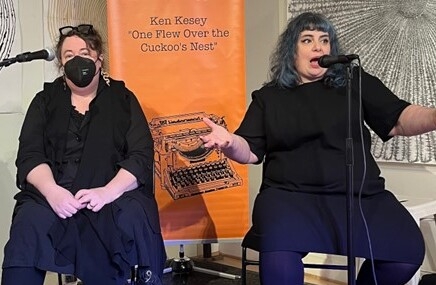 As a lifelong young adult reader, it’s no surprise that the next panel was my most anticipated of the day: the Holly Black (BOOK OF NIGHT) and Kelly Link (WHITE CAT, BLACK DOG). While the previous panelists had all hit it off swimmingly, Black and Link are actually longtime friends who even drove to Brattleboro together and participate in the same writing group. Much like Zigman and Newman, they spent nearly the entire panel laughing, but also prompting and pushing one another with riveting, personalized questions. Interestingly, Link, who has always written short stories, is gearing up to release her first novel (THE BOOK OF LOVE) this February, and she credited Black with encouraging her to explore a different type of story. On WHITE CAT, BLACK DOG, Link noted that it was Black’s own work with fairy tales that pushed her to consider fairy tales in a new, contemporary way.
As a lifelong young adult reader, it’s no surprise that the next panel was my most anticipated of the day: the Holly Black (BOOK OF NIGHT) and Kelly Link (WHITE CAT, BLACK DOG). While the previous panelists had all hit it off swimmingly, Black and Link are actually longtime friends who even drove to Brattleboro together and participate in the same writing group. Much like Zigman and Newman, they spent nearly the entire panel laughing, but also prompting and pushing one another with riveting, personalized questions. Interestingly, Link, who has always written short stories, is gearing up to release her first novel (THE BOOK OF LOVE) this February, and she credited Black with encouraging her to explore a different type of story. On WHITE CAT, BLACK DOG, Link noted that it was Black’s own work with fairy tales that pushed her to consider fairy tales in a new, contemporary way.
Speaking of fairy tales, Black retold the tale “White Cat” in a way that only she could: with humor, exclamation and perfect dialogue. The crowd was practically rolling on the floor laughing when she finished, and we were nearly begging her to write the story on paper so we could enjoy it again. (The panel was recorded, so I encourage readers to search Brattleboro’s website for it as soon as possible!) Once again, craft became a major part of the discussion as Black and Link generously detailed the ways that they draft, workshop and revise their books, often together. They agreed that as a writer, you love to either draft or revise, and Black put it perfectly, succinctly and, well, vividly when she explained her favorite and said, “Revision is like cleaning the toilet…you’re not gonna make it worse!”
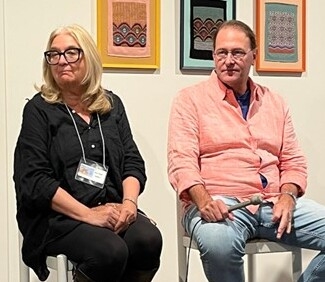 The day ended perfectly with one of the festival’s most anticipated authors: Ann Hood, who has a long career as a fiction writer and memoirist and was there to promote FLY GIRL, the memoir she wrote about her time as a flight attendant at the end of the Golden Age of flying. She was paired with a writer very near and dear to her: her husband, cookbook author and mystery writer Michael Ruhlman. It would be difficult to pick the best pairing of the day, but seeing these two lovebirds talk, joke and tease one another was definitely a highlight of the festival.
The day ended perfectly with one of the festival’s most anticipated authors: Ann Hood, who has a long career as a fiction writer and memoirist and was there to promote FLY GIRL, the memoir she wrote about her time as a flight attendant at the end of the Golden Age of flying. She was paired with a writer very near and dear to her: her husband, cookbook author and mystery writer Michael Ruhlman. It would be difficult to pick the best pairing of the day, but seeing these two lovebirds talk, joke and tease one another was definitely a highlight of the festival.
Early on, the two realized that there is one major element tying their books together: cocktails! While Hood served them thousands of feet in the air, Ruhlman recently wrote a book of perfect cocktail ratios that encouraged him and his bride to test them all…particularly while locked at home during COVID. Hood shared laugh-out-loud and jaw-dropping stories of the world of flight attending, including the misogynistic, downright draconian rules for stewardesses’ weight. She also detailed the challenges of making drinks for strange and unusual characters up high, and Ruhlman explained that cocktails, when made well, are a real art, but one that anyone can master if they simply understand the ratios. As he explains, “A Gimlet, a Daiquiri, and a Bee’s Knees are the same cocktail. As are a Cosmopolitan, a Margarita, and a Sidecar.” In his world, it’s all about ratios, and in the final panel of the day one ratio became clear: Hood and Ruhlman are 100 percent meant for each other.
Sunday, October 15th began a bit later, but no less impressively: Idra Novey (TAKE WHAT YOU NEED) and Asale Angel-Ajani (A COUNTRY YOU CAN LEAVE) joined forces to discuss motherhood, art and ambition. After evocative readings from each of their books, they talked about the nearly meta nature of fiction, which they described as a “devouring art,” both for the author (who feeds on and from their own experiences) and the reader, who gets to devour the work. This theme is represented in each of their novels, focusing heavily on motherhood, which Novey calls “cannibalistic” in desire and practice. Both authors agreed that the representation of motherhood in fiction is often fraught, but especially when paired with ambition. Novey noted that she began to find art herself only when she became a mother, and Angel-Ajani added that one of her characters becomes a better mother when she realizes that mothering is an art itself.
The theme of the panel was “dirt poor,” and while neither author would limit descriptions of their books to that theme, they thoughtfully and respectfully broke down the nature of “class” and what it means to come from and write in a particular socioeconomic class. Both agreed that art in particular can become fraught when discussing its economic class: often formally educated and wealthy authors find charm in “found” art that is usually not aesthetic but resourceful. In the same way, they noted that their characters found the beauty in their surroundings not in spite of their “dirt poor” conditions, but because of them.
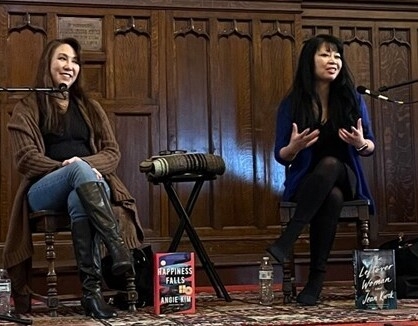 Up next was my most anticipated panel of the day: Angie Kim (HAPPINESS FALLS) and Jean Kwok (THE LEFTOVER WOMAN) discussing family dysfunction, immigrant narratives and craft. Kim and Kwok are writing partners, so the conversation shifted easily and naturally as the two discussed one another’s work, as well as their path to publication. On writing about their dysfunctional characters, Kwok noted that what she loves most about Kim’s characters is that you fall in love with each of them, adding complexity and nuance to the plot. She said of her own work, which introduces readers to the birth and adoptive mothers of a young Chinese girl, that it was important to her that readers sympathize with each woman, noting that in situations of interracial adoption, there is no right answer. Because their books deal with complicated and timely themes, both authors dwelled on the importance of writing books that did their topics justice but were also compulsively readable.
Up next was my most anticipated panel of the day: Angie Kim (HAPPINESS FALLS) and Jean Kwok (THE LEFTOVER WOMAN) discussing family dysfunction, immigrant narratives and craft. Kim and Kwok are writing partners, so the conversation shifted easily and naturally as the two discussed one another’s work, as well as their path to publication. On writing about their dysfunctional characters, Kwok noted that what she loves most about Kim’s characters is that you fall in love with each of them, adding complexity and nuance to the plot. She said of her own work, which introduces readers to the birth and adoptive mothers of a young Chinese girl, that it was important to her that readers sympathize with each woman, noting that in situations of interracial adoption, there is no right answer. Because their books deal with complicated and timely themes, both authors dwelled on the importance of writing books that did their topics justice but were also compulsively readable.
Kwok noted that her book would have been “easy” if one mother was the villain and readers only had to root for the “hero.” But as a writer, she had to “solve the dilemma” one way or another, and it took a lot of massaging for the book to arrive at a satisfying ending. Kim, meanwhile, explained how arriving in the United States at the age of 11 and unable to speak English taught her some painful lessons about oral fluency vs. intelligence or intellectual competency. In her book, one character is diagnosed with a rare disorder that prevents him from being able to communicate. Although she herself does not have this disability, Kim explained that she works closely with similar communities and that her own experiences of being unable to communicate made the cause very personal to her.
Because the authors were so well-acquainted with one another’s work and background, this panel went by extremely fast. It was one of the best of the weekend!
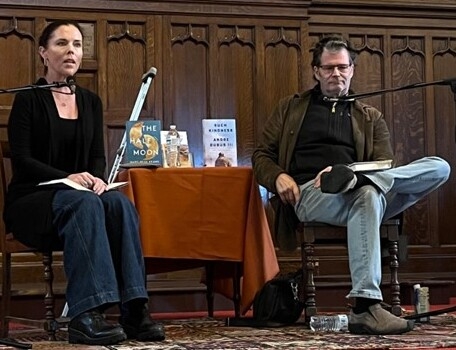 The festival was capped off for me with the pairing of Mary Beth Keane (THE HALF MOON) and Andre Dubus III (SUCH KINDNESS). Writers of some of the strongest literary fiction today, Keane and Dubus spoke largely about craft, but also about their working-class backgrounds and what it means to write in a space in which they no longer reside. Speaking on the sparks for their works, Keane noted that she wanted to write about someone completely different from her: someone gregarious and for whom everything always seems to go right…until it doesn’t.
The festival was capped off for me with the pairing of Mary Beth Keane (THE HALF MOON) and Andre Dubus III (SUCH KINDNESS). Writers of some of the strongest literary fiction today, Keane and Dubus spoke largely about craft, but also about their working-class backgrounds and what it means to write in a space in which they no longer reside. Speaking on the sparks for their works, Keane noted that she wanted to write about someone completely different from her: someone gregarious and for whom everything always seems to go right…until it doesn’t.
Dubus, meanwhile, found his inspiration in growing up “not horrible, but in first-world poverty.” Although he has now found laudable success, he explained that he has never stopped identifying with the poor and has never quite felt comfortable as a member of any other class --- indeed, even when he is not writing, he does his own contractor work and cleans toilets. SUCH KINDNESS arose from wondering what his life might look like if he had only done these things and had never written.
These talented writers were perfectly matched in sharing literary quotes, perspectives on craft, and what it means to be a writer who reads (everything, according to them).
All in all, it was a fantastic weekend with some of the best-matched panelists this reader and festivalgoer has ever seen. Hats off to the Brattleboro community --- not just the festival organizers, but also the restaurants that served literary-themed drinks all weekend; the stores that front-windowed books and festival posters; and the welcoming, friendly citizens who made all attendees feel like they had been whisked away on a magical weekend and never left the comfort of their own armchairs.







